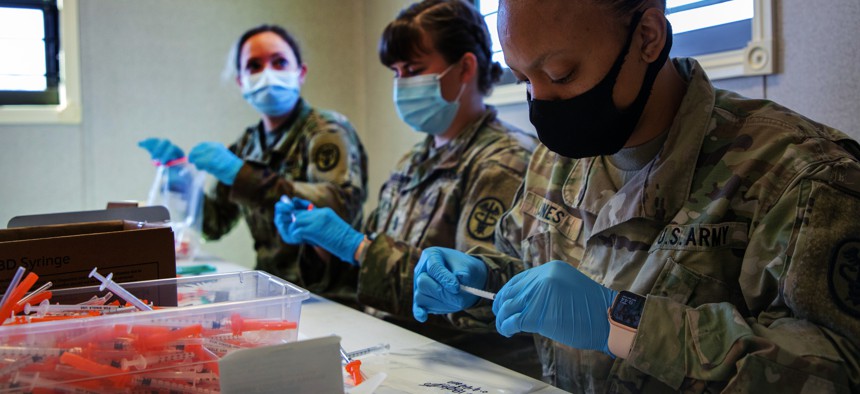
U.S. Army / Spc. Michael Ybarra
Republicans rehash vaccine mandate policies in defense authorization bill amendments
House Armed Services Committee markup adds legislation aimed at helping troops who refused the COVID-19 vaccine.
Several Republican House lawmakers are trying to force the Pentagon to allow troops who were separated for refusing the COVID-19 vaccine to rejoin the service, get back pay, and avoid other usual consequences of refusing a lawful order.
The Defense Department rescinded its vaccine mandate earlier this year as required by the 2023 National Defense Authorization Act, which stopped the Pentagon from removing unvaccinated troops who did not have an approved exemption. Troops who had already been kicked out can have their records corrected, and can choose to rejoin using the process already in place to do so.
During the House Armed Services Committee markup for the 2024 NDAA, a handful of Republican lawmakers introduced several COVID-19 vaccine-related amendments, hammering home the Republican position that the vaccine should have been a choice, and the DOD’s mandate hurt troops who had religious or moral reasons for refusing the vaccine.
Rep. Jim Banks, R-Indiana, the chairman of the House Armed Services personnel subcommittee, introduced three amendments related to the vaccine mandate, including one to protect troops who refused the vaccine from adverse actions and to require the military service secretaries to consider reinstating troops at their previously held rank. It would also make the services treat the time between their separation and reinstatement “a period of inactivation from active service,” according to the document, just like the military’s Career Intermission Program, Banks said.
“This provides a fair, equitable, and honorable option for our wrongly separated service members—many who filed legitimate religious exemptions and were ignored—to return to their ranks without any detriments to their career progression, especially in a time of great need as we face the greatest recruiting crisis since the establishment of the all-volunteer force,” said Banks.
Rep. Adam Smith, D-Wash. the ranking member of the House Armed Services Committee, objected to the amendment, saying it and others like it set a “really dangerous precedent” for the committee, because they tell troops they have the option to refuse a lawful order.
“Also, now that we have lifted that requirement as the pandemic has passed, the secretary of defense and the Department of Defense is going through a process of reinstating some of these members. I don't think we should be dictating what that process is,” Smith said.
Using the Career Intermission Program as a model to help reinstated troops have normal careers may not be a good idea because the program is too new to see whether program participants “are actually facing unintentional discrimination in promotion boards,” said Katherine Kuzminski, a senior fellow and the director of the Military, Veterans, and Society Program at the Center for a New American Security.
Even if information about being separated for refusing the vaccine and then being reinstated are deleted from someone’s file, the file will still look different than others under consideration, Kuzminski said.
“That is kind of the internal politics of boards,” she said.
Banks also submitted an amendment to prioritize correcting the records of troops who were kicked out, and another to require the Pentagon to individually inform them of the process to rejoin.
Smith said the latter is “just a pointless burden placed on the DOD to develop a strategy that they already have and are already using.”
Rep. Ronny Jackson, R-Texas, submitted an amendment that would exempt military academy students who were kicked out for not being vaccinated from having to reimburse the costs of their education.
“Cadets and midshipmen who spent four years working towards their commission were placed in the unfair position of having to make a choice between their sincerely held beliefs, or being forced to literally pay the price for politically motivated mandates that were not in place…when they first decided to attend the academy,” Jackson said.
Rep. Patrick Ryan, D-N.Y., a graduate of the United States Military Academy at West Point, said “orders are a part of being a cadet, a midshipman, and ultimately a future commissioned officer.” He added that the defense secretary already has the authority to exempt student repayments and has used it in two vaccine-related cases.
While these amendments largely cover authorities and processes the defense and military secretaries already have, Kuzminski said trying to put them in the NDAA is “enshrining a political preference into something that the department can already do, and it’s turning it into a—the department must do.”
Rep. Matt Gaetz, R-Fla., who submitted his own amendment related to the vaccine mandate, said he supports “all the amendments that allow for a reinstatement and additional remedies that we’ll define here for our service members, because we're not a stronger military as a consequence of this vaccine mandate.”
The amendments were approved by a voice vote at the time they were submitted, but requests for recording the individual votes were postponed.







